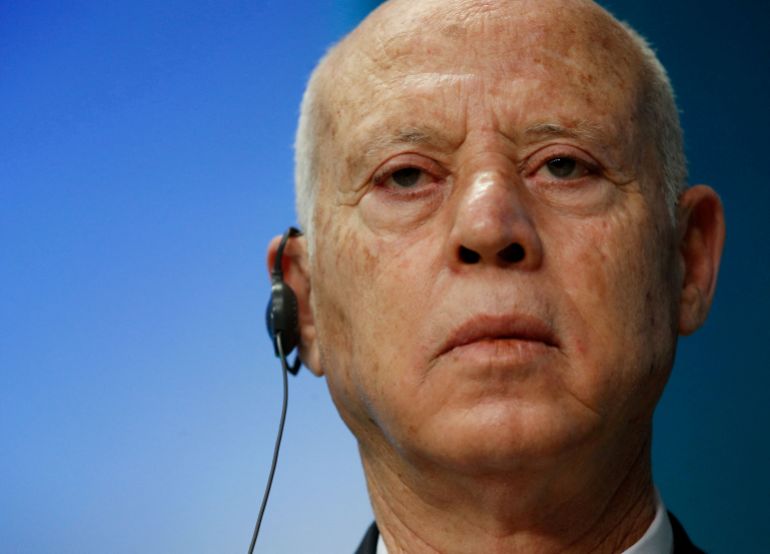Confrontation between Tunisia’s General Union, President Saied escalates | Politics News
Tunisia’s General Labour Union (UGTT) is poised to take on President Kais Saied in a protest scheduled for August 21.
The union called for a protest against what it says are government attempts to undermine workers’ rights, and the use of intimidation to curb strikes, referring to a three-day UGTT transport strike at the end of July.
Since he seized power on July 25, 2021, Saied has radically undermined the role of parliament and political parties while granting himself vastly increased powers through a constitution revised according to his edicts.
Yet the UGTT’s ability to mobilise its hundreds of thousands of members stands as one of the few remaining counters to Saied, analysts say.
“The UGTT has always been more than just a trade union,” Hamza Meddeb of the Carnegie Institute, who has written extensively on the organisation, told Al Jazeera.
“It was established even before Tunisian independence, and played a significant role in achieving that,” he said of Tunisia’s liberation from France in 1956.
“Since then, it’s played both an economic role … as well as a political role, such as in 2015, when it was the principal force behind establishing the National Dialogue,” Meddeb continued, referring to a political crisis when the UGTT and three other civil society organisations helped prevent the collapse of Tunisia’s post-revolutionary democracy.

Inevitable confrontation
Matters reached a head between UGTT and Saied on August 7 when hundreds of Saied’s supporters rallied outside UGTT headquarters, accusing it of “corruption” and “squandering people’s money” after a three-day transport strike in late July paralysed much of the country.
The following night, Saied defended the anti-union protesters, repeating their calls for union “accountability” and stressing that, contrary to claims from both the UGTT and rights groups, his supporters had not intended violence.
“There are files that must be opened because the people are demanding accountability … so that their money can be returned to them,” Saied said in a video posted on the presidency’s official Facebook page.
Further confrontations between the president and the union were inevitable, but many analysts point to what they say is a union weakened by internal schisms and the threat to its decades-long monopoly on union power in Tunisia.
“For the past two years, the UGTT has been silent, certainly on the political side of things,” a political analyst who remained in Tunisia told Al Jazeera, on condition of anonymity.
“Saied even revised the labour code without consulting them,” they said of the May decision to change laws that affected many of UGTT’s members.
“Previously, making a decision on that scale without the UGTT would have been inconceivable,” he said.

A weakened union
Much of the UGTT’s relatively low profile lies in an internal rupture, prompted by its decision in 2021 to extend its board’s mandate from two to three terms, which is said to have splintered the union’s membership and undermined it.
“There are many in the UGTT who see the 2021 decision as a coup d’etat of the union’s own, which has really weakened the board’s decision to do anything,” Meddeb said.
“You also can’t avoid the fact that the financial situation across the country is getting much, much worse, which means that the core membership of the union – the state-dependent middle class – are also suffering, and are blaming a board they already have little faith in for that, too.
“So, when Saied calls it a ‘corrupt union’ … that makes sense to much of its membership,” Meddeb said.
“It’s also easy, [given its long history and close relationships with all of Tunisia’s past governments] for Saied to paint it as part of the country’s elite that has been holding its people back,” he concluded.
A rival union emerges
Moves to undermine the UGTT’s base are already under way.
On Monday, the government announced it would halt the longstanding practice of allowing union officials to receive their government salaries while on union business, with more such moves expected.

Saied is also said to be encouraging the rival Union of Tunisian Workers (UTT), which analysts such as author Hatem Nafti say could try to take advantage of any weakening of the bond between the UGTT and its membership, to boost its standing.
How successful that would be in light of the UTT leadership’s previous convictions on corruption charges, remained to be seen, he added.
That the UTT is ready to step into any breach left by the UGTT was clear last week, when it issued a statement accusing its rivals of what it said was the “defamation” of the president.
Nafti said that the government might also seek to halt the practice of deducting UGTT membership fees from state employees’ salaries at source before transferring the funds to the union, which would give UTT more hope of winning members away from UGTT.
“That Kais Saied would move against the UGTT was written from day one,” Nafti told Al Jazeera from Paris, where he now lives.
“Populism doesn’t allow any mediator between the leader and the people, so firstly, he got rid of rival political parties, then civil society and the media.
“Even the television networks that support him don’t show political programmes any more,” he said.
“The UGTT was the logical next step.”
confrontation-between-tunisias-general-union-president-saied-escalates-politics-news
#Confrontation #Tunisias #General #Union #President #Saied #escalates #Politics #News

